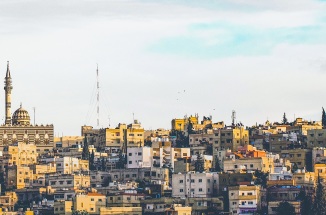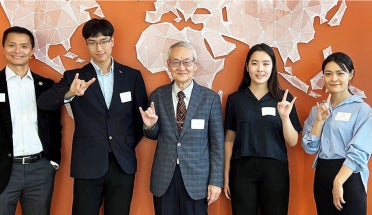
2020-2021 President’s Award for Global Learning Finalist Teams Selected
- Sep 4, 2020
- Global Initiatives
Twelve interdisciplinary teams of student and faculty researchers have been selected to pitch their multifaceted international projects for the 2020-2021 President’s Award for Global Learning.
The teams’ projects cover issues in every region of the world, such as improving health literacy for Rohingya refugees in Bangladesh, exploring innovative community housing ideas in France and creating an online exhibit examining systematic obstacles to artists of color in the Bahamas.
Each year, select teams of students and faculty mentors are chosen to receive the President's Award for Global Learning after a competitive process to pursue interdisciplinary projects relating to international research, social impact and entrepreneurship. The award, a signature program of the International Board of Advisors, advances the university’s global engagement and enhances student learning with hands-on international experiences to forge leaders and innovators with robust cross-cultural knowledge.
In total, there were 33 proposals submitted from teams comprised of 128 students representing 10 colleges and 82 faculty representing 15 colleges. A review committee of university leaders and faculty from colleges and schools across campus reviewed the proposals and selected 12 finalist teams.
The finalists will participate in a virtual pitch competition in October to a panel of senior university leadership. From the 12 teams, up to two award winners per region will be selected for a total of six winning teams. The awardees will receive up to $15,000 toward project implementation costs as well as additional travel and academic financial support.
The recipients of the 2020-2021 President's Award for Global Learning will spend the spring and summer semesters at UT conducting research and collaborating with in-country partners to implement their projects, then travel abroad to their project site for one to two weeks during summer 2021.
Please join us in congratulating the finalist teams on their outstanding proposals:
Asia and Oceania
Knowledge is Power: M-Learning-Facilitated Health Empowerment for the Rohingya Refugees of Cox’s Bazar, Bangladesh
Create educational public health and health literacy videos for the Rohingya refugee community in Bangladesh
Student team members: Soufia Ali, Mahija Ginjupalli, Oishika Das, Maharajni Perla
Faculty team members: David Eaton, Anjum Khurshid, Jennifer Adair
Graduate student team member: Dana Reilly
Conversations about Conservation: A Community-Based Research Study to Comprehend Public Engagement in Conservation Initiatives
Implement a community-based research model on local mangrove conservation efforts to emphasize the importance of collaborative approaches to climate change
Student team members: Emily Samson, Yukta Sunkara, Gauree Srinivasan, Sanjna Bhatia
Faculty team members: Jason Cons, Erin Lentz, Deepak Chetty
Graduate student team member: Sachin Dheeraj Mudigonda
Human Trafficking in the Philippines: Expanding Awareness and Education to Current and Rising Healthcare Professionals
Implement a community-based research program to identify service needs that help trafficking survivors recover from trauma and co-create an educational curriculum to train current and future healthcare service providers
Student team members: Daniela Gonzalez, Christopher Ligon, Laura Souto, Sarah Stransky
Faculty team members: Esther Nwokocha, Bruce Kellison
Graduate student team member: Weiwen Zeng
Skin Cancer in Singapore: Using Augmented Reality to Promote Skin Cancer Prevention Efforts
Explore an updated approach to traditional public health initiatives through innovative communication technologies to distribute an interactive and experiential campaign about skin cancer prevention among young adults
Student team members: Neha Momin, Sahar Ali, Daniel Killough, Arman Farsad
Faculty team members: Erin Reilly, Lucy Atkinson, Thushani Herath
Europe, Middle East and Africa
A Tale of Two Cities: How the 2024 Paris Olympics can Influence Perceptions of Identity Amongst Marginalized Groups in Paris' Banlieues
Identify the factors that contribute to French identity in Parisian suburbs or "banlieues" and the ways that the 2024 Paris Olympics might influence perceptions of identity
Student team members: Nana Acheampong, Hrishabh Bhosale, Ninel Akhmadikina, Jessica Lusekelo
Faculty team members: Harel Shapira, Heather Pelletier
Graduate student team member: Marylise Rilliard
Tiny Houses for Immigrants: A Participatory Action Study of Housing Solutions in Paris and Austin
Work with the community to learn the impacts of various design choices in housing projects on refugee integration and wellness before, during and after COVID-19
Student team members: Clarissa Rodríguez Abrego, Katie Mulry, Lizeth Rayas, Ximena Mercado Garcia
Faculty team members: Paul Adams, Patricia Wilson
Graduate student team member: Anaïs Zimmer
Fostering Green Entrepreneurialism: A Comparison of Water Conservation Practices and Behaviors in Jordan and Texas
Compare campus water conservation efforts and overall water conservation technology and practice both in Texas and in Jordan
Student team members: Kisara Dang, Sumaya Daghestani, Abby Partridge, Tanya Raghu
Faculty team members: David Eaton, Lucy Atkinson, Jayme Walenta
Once Upon Two Times: Capturing Past and Present Narratives in South Africa
Capture oral folktales and personal experiences recounted by South African youth and their families into written storybooks that contain moral lessons addressing community-identified issues
Student team members: Velta Brenya, Shreya Thiagarajan, Sungavi Sambasivam, Lori Woo
Faculty team members: Leonard Moore, Chelsi West Oheuri, Jane Champion
Latin America and the Caribbean
Artistic Barriers: Exhibiting Systematic Obstacles Faced By Artists of Color
Create an online exhibit of the stories and artwork of Bahamanian and UT artists to explore the systematic obstacles faced by artists of color
Student team members: Madison Cooper, Aurora Isaac, Viren Velacheri
Faculty team members: Edward Chambers, Almeida Jacqueline Toribio, Andrew Garrison
Graduate student team member: Sophia Monegro
Young Innovators: Bringing Inductive Learning to Early STEM Education in Jamaica
Catalyze the shift toward inductive STEM learning in Jamaican primary students
Student team members: Pearlyn Ang, Christopher Calizzi, Anthony Tang, Catherine Tang
Faculty team members: Melissa Kemp, Hal Alper, Brent Iverson
Graduate student team member: Bernard David
The Case for Connections: Understanding the Effect of Social Networks on the Academic Stress of Undergraduates in Austin, Texas and Mexico City, Mexico
Explore the role of social networks on the perceived academic stress levels of Mexican and Texan undergraduates
Student team members: Thomas Dang, Melanie Milligan, Grace Ozor, Mariana Rendon Flores
Faculty team members: Deborah Parra-Medina, Carmen Valdez, Keri Stephens
Graduate student team member: Alfonso Rojas Alvarez
People for Pasco: Addressing Peru's Lead Toxicity on Childhood Behavior
Design a co-generated model to administer a standardized behavioral health assessment in communities in Cerro de Pasco with close proximity to mines, and use the data to support national and international cases to hold the mining industry accountable for polluting the city
Student team members: Stephanie Costa, Gracie Onyia, Zuena Karim, Carrie Meng
Faculty team members: Gray Garmon, Lauren Gambill, Kasey Faust



